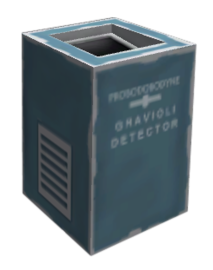Difference between revisions of "GRAVMAX Negative Gravioli Detector"
From Kerbal Space Program Wiki
| Line 8: | Line 8: | ||
While active, the gravimeter drains 0.0075 [[electric charge]] per second (27 E/hr). | While active, the gravimeter drains 0.0075 [[electric charge]] per second (27 E/hr). | ||
| − | The detector does not function in high orbits depending on the orbited body. | + | The detector does not function in high orbits depending on the orbited body.Last known working altitudes and values at them: |
{| class="wikitable" | {| class="wikitable" | ||
! Celestial body | ! Celestial body | ||
Revision as of 00:03, 26 July 2013
| GRAVMAX Negative Gravioli Detector | ||
| Environmental sensor by Probodobodyne Inc | ||
| Radial size | Radial mounted | |
| Cost | (total) | 8 800.00 |
| Mass | (total) | 0.005 t [1] |
| Drag | 0.2 [1] | |
| Max. Temp. | 1200 K | |
| Impact Tolerance | 8 m/s | |
| Research | | |
| Unlock cost | 12 200 | |
| Since version | 0.18 | |
| Part configuration | sensorGravimeter.cfg | |
| Experiment | Gravity Scan | |
| Collectable | Yes | |
| Rerunnable | Yes | |
| Resettable | Yes | |
| Electricity required | 0.0075 ⚡/s | |
| Packed volume | 5 l | |
| ||
The GRAVMAX Negative Gravioli Detector displays gravity in meters per second squared when right clicked.
Usage
This instrument shows the gravity in your current sphere of influence to 4 significant figures. This can be used with altitude to estimate the mass of the nearest celestial body or to measure it's surface gravity. Alternatively, it can be used with the accelerometer and altitude to make landing estimates.
While active, the gravimeter drains 0.0075 electric charge per second (27 E/hr).
The detector does not function in high orbits depending on the orbited body.Last known working altitudes and values at them:
| Celestial body | Altitude | Gravitational acceleration |
|---|---|---|
| Kerbol | < 13 599 840 km | > 0.00633845348 m/s² |
| Kerbin | 1 800 km | 0.61 m/s² |
| Mun | 600 km | 0.1 m/s² |
| Minmus | 180 km | 0.03 m/s² |
Measurements from various places in Kerbol planetary system:
| Celestial body | Altitude | Gravitational acceleration | Measurement location[note 1] |
|---|---|---|---|
| Kerbol | < 13 599 840 km | > 0.00633845348 m/s² | orbit |
| Kerbol | 1 110 651 m | 16.99 m/s² | orbit |
| Moho | 5172 m | 2.59 m/s² | surface |
| Eve | 304 m | 16.66 m/s² | surface |
| Kerbin | 1 800 km | 0.61 m/s² | orbit |
| Kerbin | 0 m | 9.81 m/s² | surface |
| Mun | 600 km | 0.1 m/s² | orbit |
| Mun | 566 m | 1.62 m/s² | surface |
| Minmus | 180 km | 0.03 m/s² | orbit |
| Minmus | 4360 m | 0.43 m/s² | surface |
| Duna | 3321 m | 2.88 m/s² | surface |
| Ike | 5858 m | 1.01 m/s² | surface |
| Dres | 1990 m | 1.10 m/s² | surface |
| Laythe | 120 718 m | 5.09 m/s² | orbit |
| Laythe | 3846 m | 7.73 m/s² | surface |
| Laythe | 17 m | 7.85 m/s² | surface |
| Vall | 2440 m | 2.27 m/s² | surface |
| Tylo | 2594 m | 7.78 m/s² | surface |
| Pol | 898 m | 0.36 m/s² | surface |
| Eeloo | 1712 m | 1.66 m/s² | surface |
- ↑ On surface, in atmospherical flight or in orbit.
Description
| “ | A device for capturing and measuring the elusive Negative Gravioli Particle, used for determining the precise strength of gravitational fields. Warranty void if used to detect Positive Gravioli Particles, — Probodobodyne Inc. |
” |
Changes
- Initial Release
